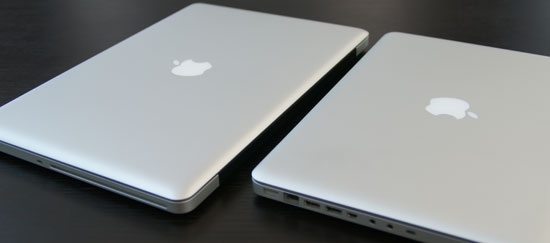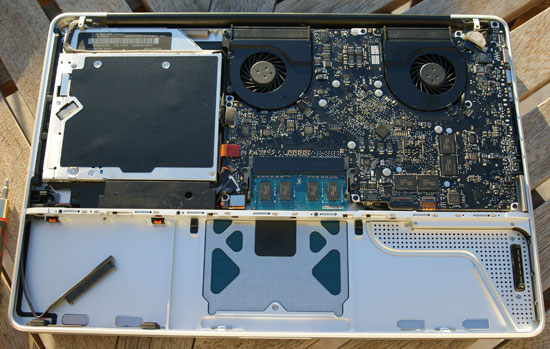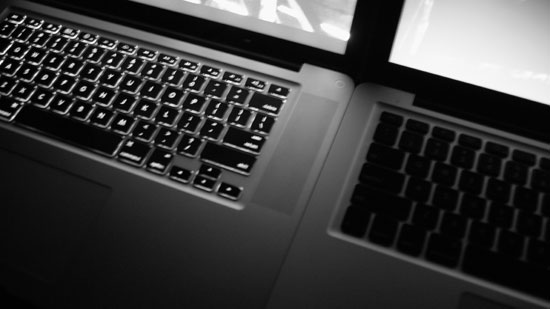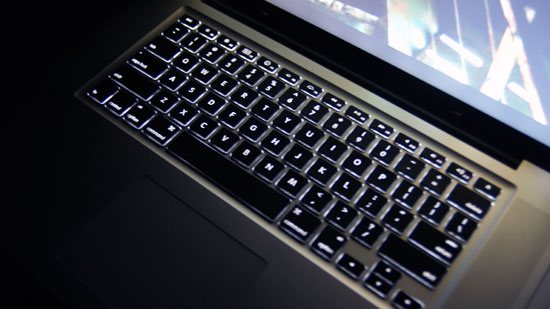Apple's Redesigned MacBook and MacBook Pro: Thoroughly Reviewed
by Anand Lal Shimpi on October 22, 2008 12:00 AM EST- Posted in
- Mac
The New MacBook Pro
The new MacBook Pro looks larger than the older one thanks to its increased size in width and depth. The thickness of the system went down thanks to the mini DisplayPort output, cooler chipset and thinner aluminum chassis, which makes it feel better in your hands. Build quality is much improved from the previous generation, and just like the new MacBook, this thing feels like you're getting what you paid for.

The MacBook Pro (left) vs. the MacBook (right)
| New MacBook Pro 15" | 2008 Penryn MacBook Pro 15" | 2007 Merom MacBook Pro 15" | |
| Dimensions | H: 0.95" W: 14.35" D: 9.82" |
H: 1.0" W: 14.1" D: 9.6" |
H: 1.0" W: 14.1" D: 9.6" |
| Weight | 5.5 lbs | 5.4 lbs | 5.4 lbs |
| Screen Size/Resolution | 15.4" / 1440 x 900 (LED backlit) | 15.4" / 1440 x 900 (LED backlit) |
15.4" / 1440 x 900 (LED backlit) |
| CPU | Intel Core 2 Duo 2.4GHz, 2.53GHz or 2.80GHz (45nm Penryn, 1066MHz FSB) | Intel Core 2 Duo 2.4GHz - 2.6GHz (45nm Penryn, 800MHz FSB) | Intel Core 2 Duo 2.2GHz - 2.6GHz (65nm Merom, 800MHz FSB) |
| GPU | NVIDIA GeForce 9400M (mGPU) + GeForce 9600M GT dGPU (256MB or 512MB GDDR3) | NVIDIA GeForce 8600M GT (256MB - 512MB) | NVIDIA GeForce 8600M GT (128MB - 256MB) |
| Memory | 2GB - 4GB DDR3 1066 | 2GB - 4GB DDR2-667 | 2GB - 4GB DDR2-667 |
| HDD |
250GB - 320GB 2.5" 5400RPM SATA |
200 - 250GB 2.5" 5400RPM SATA 200GB 7200RPM SATA |
120 - 250GB 2.5" 5400RPM SATA 200GB 7200RPM SATA |
| Optical Drive | Integrated SuperDrive | Integrated SuperDrive | Integrated SuperDrive |
| Networking | 802.11a/b/g/n 10/100/1000 Ethernet |
802.11a/b/g/n 10/100/1000 Ethernet |
802.11a/b/g/n 10/100/1000 Ethernet |
| Built in iSight | Yes | Yes | Yes |
| Inputs | 2 x USB 2.0 1 x FireWire 800 1 x ExpressCard/34 1 x Audio in 1 x Integrated mic |
2 x USB 2.0 1 x FireWire 400 1 x FireWire 800 1 x ExpressCard/34 1 x Audio in 1 x Integrated mic |
2 x USB 2.0 1 x FireWire 400 1 x FireWire 800 1 x ExpressCard/34 1 x Audio in 1 x Integrated mic |
| Outputs | 1 x Audio 1 x Mini DisplayPort |
1 x Audio 1 x dual-link DVI |
1 x Audio 1 x dual-link DVI |
| Battery | 50WHr | 60WHr | 60WHr |
| Price | $1999 | $1999 | $1999 |
With the MacBook Pro you get something that looks like a larger MacBook. Thanks to the 15.4" screen there's enough keyboard real estate to provide two external speakers responsible for a better sound than what you get from the base MacBook. Then there's the backlit keyboard, which you don't get with the MacBook. There's an ExpressCard/34 slot and a faster Core 2 CPU by default (2.4GHz vs. 2.0GHz in the MacBook). And finally you get the GeForce 9600M dGPU in addition to the GeForce 9400M, driving a higher quality, higher resolution 15.4" panel.

The MacBook Pro motherboard, note the two fans - one for the CPU and one for the GeForce 9600M
The differences between the MacBook and MacBook Pro actually haven't changed all that much; you get more ports, faster hardware and a better display. The difference here is that the $1299 MacBook is closer to the Pro than the old one ever was. I'd say the biggest reasons to move to the MacBook Pro are if you need the additional screen real estate, ExpressCard port or the GeForce 9600M. The majority of users will probably be well served by the new MacBook.

The MacBook Pro (left) vs. the MacBook (right)











66 Comments
View All Comments
Calin - Friday, October 24, 2008 - link
What about testing power use under XP I meanXP compares more favourably to Mac OS (or anything else) than Vista, and I wanted to know if that excessive power use is Vista-only, or if it does appear on Windows XP too
strikeback03 - Thursday, October 23, 2008 - link
Or some version of Linux?wilkinb - Wednesday, October 22, 2008 - link
yeh I agree the diff will be how the OS is set to manage each device etc etc...On my Sony laptop i get around 2 hours on high performance and a bit over 5 hours on battery saving...
The results they posted dont really tell us much other then a bootcamp vista install isnt as good as an osx install at managing power on apple laptop... amazing right?
I am sure if i dont use the Sony install and tool/drviers etc I will also get less battery life on my laptop. So the question would be do you think apple put more effort into power management on their OSX install then they did for Vista?
JarredWalton - Wednesday, October 22, 2008 - link
Let me just say that I've tried testing various power saver setting under Vista on several notebooks (see review on Friday) and I just can't get anywhere near 5 hours of battery life. Sure, the CPUs are a bit higher spec on some of the notebooks, but as one example a 12.1" laptop with 55 Whr battery, 320GB 5400RPM HDD, 4GB RAM, LED backlighting, and P8400 pulls an "amazing" 138 minutes of DVD playback and 142 minutes of web surfing... though it does manage 261 minutes when sitting idle at the desktop.As best I can tell, the CPU and HDD just don't seem to be entering sleep modes much if at all, unless the system is 100% idle. Even then, 261 minutes idle battery life doesn't compare favorably to the MacBook pulling 286 minutes of web surfing.
How big is the Sony battery, if I may ask? (Just for reference, take Voltage * mAhr to get Whr.) What sort of CPU, GPU, HDD, RAM does it use? What we need to see to prove it's possible is a Vista laptop with a 20W TDP CPU, 2GB RAM, 5400 RPM HDD, and 13.3" LED backlit LCD that can still get close to five hours of battery life with a 55 Whr battery. If you think you have one, get the manufacturer to send me one for review! :)
Spivonious - Thursday, October 23, 2008 - link
Are you guys turning off the Vista indexer and SuperFetch? Those two things would run the harddrives pretty constantly on a fresh install, which would definitely drag down battery life.JarredWalton - Thursday, October 23, 2008 - link
Do normal users disable SuperFetch? I've disabled indexing as much as I know how, since I don't use it, but SuperFetch is part of Vista. Besides, it shouldn't run on battery power (and neither should indexing).Spivonious - Friday, October 24, 2008 - link
If you want to actually test Vista battery life, install the OS and use it for a week before testing the battery life. I agree with the other poster that both the indexer and SuperFetch are great features, but they do spin the harddrive when the computer is idle until the index is built and SuperFetch learns what you use most often.Spinning harddrive = lower battery life
Comparing battery life between Vista and OS X is like comparing the time it takes to eat a pomegranate and an apple.
headbox - Saturday, October 25, 2008 - link
no, battery tests let people know how long they can use their computer without plugging it in.You're not comprehending the article- the PC laptops are also being tested at idle, just sitting there doing nothing. If Vista is going to spend that entire time "superfetching" nothing, that's a problem.
jonmcc33 - Thursday, October 23, 2008 - link
No, normal users do not disable SuperFetch. That's just bad tweaking advice, as much as turning Indexing off is as well. Both are amazing features added to Vista.I tested a Latitude D630 (2.6GHz Core 2 Duo Penryn, 2GB RAM) with Vista Business and a 9-cell 85WHr battery. Life was over 5 hours.
JarredWalton - Thursday, October 23, 2008 - link
I wouldn't be surprised if there's just some glitch on many of the laptops that's keeping battery life down, but until some manufacturer can deliver Vista with 55 Whr and 5 hours (give or take) battery life I remain skeptical. Users shouldn't have to hack their laptop in any way to get the increased battery life; it should just work properly out of the box. You know, like the MacBooks with OS X.